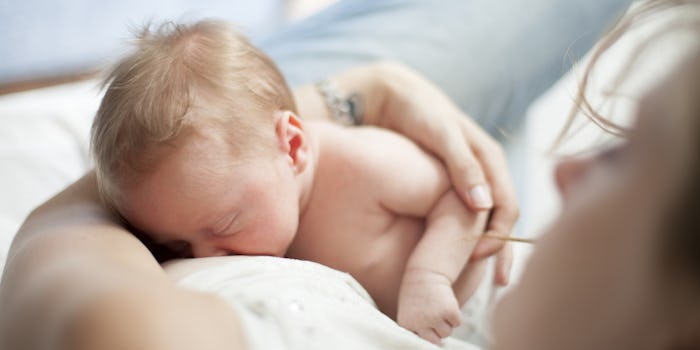Life

The One Thing We Don't Say To Women About Breastfeeding, But Totally Should
Before a woman even becomes a mother, she's inundated with numerous factoids and opinions about breastfeeding. Women are told that they should breastfeed on demand, breastfeed with a cover, feel comfortable breastfeeding without a cover and to breastfeed for as long as possible. Honestly, society tells women a lot of things about breastfeeding and how they should feed their newborns, but the one thing we don't say to women about breastfeeding (and totally should) is that it's not always a choice.
Yes, we're all made well aware about the benefits of breast milk; how cost-effective it is, how breastfeeding promotes bonding, how breast milk has been linked to higher IQs in children and can lower a mom's risk of breast cancer and is even potentially capable of reducing the risk of SIDs. And yes, some women choose to breastfeed their children and some women choose not to, but many women have that choice taken away from them. There are a multitude of situations that end up making the choice for the mother, essentially stripping her of the ability to make one of her very first parenting decisions. So, when "breast is best" is constantly being regurgitated, bombarding every new mother at seemingly every turn in the hopes she'll choose to breastfeed, it's essentially saying to moms who were unable to breastfeed that they're failing and broken and somehow faulty. It's saying, "Hey mom, I know you're heartbroken that you can't breastfeed, but you're also a horrible mother because you're not doing what many mothers have already done or are currently doing or will probably do in the future."
Women who've had breast reduction surgery, or any other kind of breast-related procedure, may not be able to breastfeed. Women who have serious illnesses (such as heart problems) are often told they can't breastfeed. Women who are undergoing treatment for cancer, and are receiving radiation or chemotherapy, cannot breastfeed. These women, and women with similar issues or situations, are rarely given the chance to even choose breastfeeding, yet they're still made to feel horrible or less than or like a failure when they're told that they should choose to provide their newborn with breastmilk. And at a time when a woman is arguably at her most vulnerable (filled with self-doubt and attempting to navigate parenthood and adjust to a new lifestyle) the last thing she needs to hear is that she's inherently wrong and should feel bad for something that is entirely out of her control.
Many women who have survived a sexual assault and/or rape, find themselves incapable of breastfeeding. Even if they can physically express breast milk and adequately sustain their newborn, the act of breastfeeding becomes an emotional trigger; as devastating as it is real and relentless and unforgiving. And while many sexual assault survivors do go on to successfully breastfeed their children, many simply cannot; the sensations, emotions, and vivid images the act of breastfeeding can harbor become too much to handle. While it is important to think about what is best for any baby, it is also just as important to think about what is best for any mother, and it is not weak or selfish to look internally and decide that something is too much to take on or deal with. If breastfeeding is emotionally scarring to a mother who has suffered through something as traumatic as sexual assault and/or rape, breast really isn't best.
And, of course, there are women who choose to breastfeed, but are unsuccessful. Whether it was an issue with latching, problems with milk production, or an ongoing infection that made breastfeeding painful and/or dangerous; sometimes those who do make the choice to breastfeed, simply cannot. Even though they made the choice so many are telling them is the "right" one to make, they can't breastfeed successfully, and in order to sustain their newborn they do have to rely other sources (i.e. formula) and that decision shouldn't be looked down on or judged or shamed. In fact, that mother is literally sacrificing what she wanted (breastfeeding) for what is necessary (formula) and should be applauded for seeing past her own desire to experience breastfeeding in order to do what is absolutely necessary for her baby's health and wellness.
So sure, for many women, to breastfeed or not to breastfeed is a choice; a choice that should always be respected, as a mother is entitled to feed her kid in any safe, healthy manner she chooses. However, it's impossible to know the reason behind those decisions and, sometimes, the reason why there wasn't a decision at all. Instead of constantly telling women that "breast is best" and assuming every mother has the ability to choose how she feeds her child, we need to trust women and their ability to make the best decision for themselves, their families and their futures. There's so much that goes on underneath the surface, that we simply cannot, and do not, know.